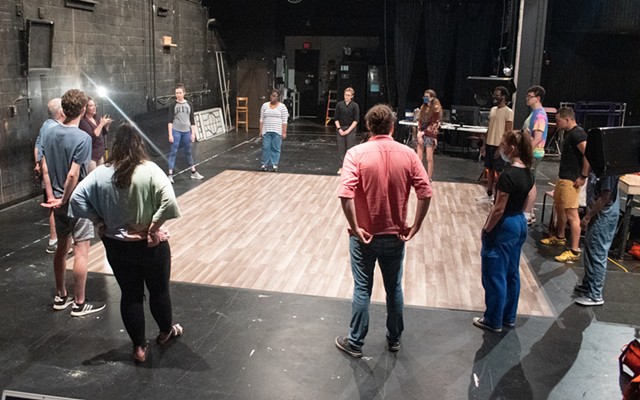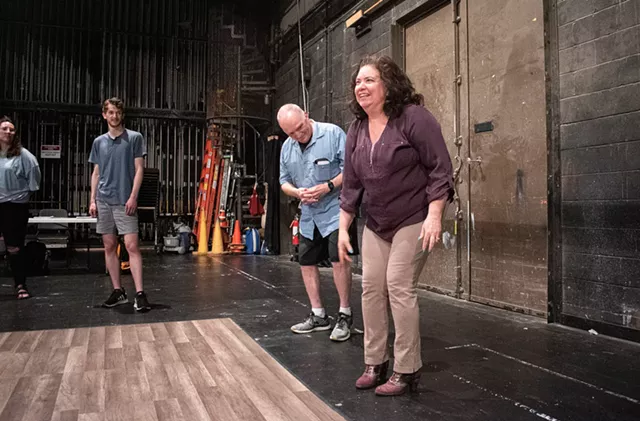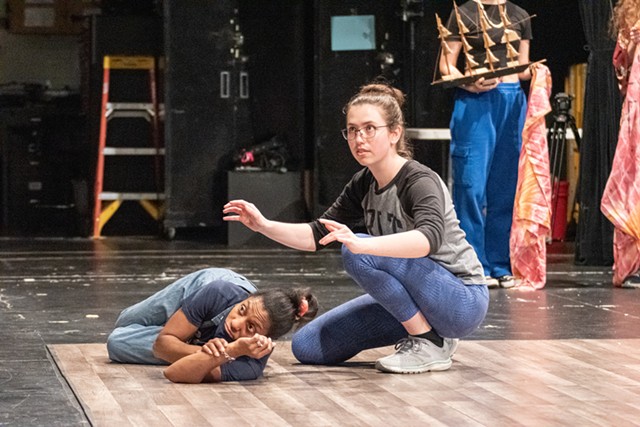A group of deaf and listening to actors stood in a circle onstage. Nobody spoke. Via eye make contact with and a shared feeling of pleasurable, they imagined their breath experienced condensed into an invisible ball, which they threw, kicked, and carefully tossed about the circle.
A yr in the past, the thought of sharing breath would have been alarming instead than playful, but everybody in the solid was vaccinated. This heat-up started off a rehearsal for the Rochester Local community Players’ output of “The Tempest” — offered in both of those American Indication Language and English — which performs at the Highland Bowl on South Avenue from July 9 by twenty five as this summer’s Shakespeare in the Park output.
“The Tempest” will take position on a deserted island, where Prospero and his daughter Miranda have been dwelling with magical spirits for twelve yrs. Their quarantine finishes when a shipwreck brings Prospero’s previous enemies to shore.
Although director Luane Davis Haggerty hopes paying out time on this island will come to feel like a significantly desired trip for audiences, she was mostly drawn to the engage in for its magic, which makes it possible for her to explain the double truth of the twin-language output.
With a background as a playwright, actor, and theatre educator, Haggerty also has enough knowledge directing shows that bridge deaf and listening to actors, most not too long ago with “Spoon River Anthology” at Rochester Institute of Technology’s Countrywide Technical Institute for the Deaf. However a listening to person, Haggerty turned fluent in ASL at a younger age by developing up with a deaf grandmother. She teaches at NTID, which is presenting “The Tempest” as a theater practicum for the summer months session.
In Haggerty’s vision for the engage in, the deaf actors portray the characters as written by Shakespeare, only in ASL. The listening to actors engage in spirits from the island, who voice for them making use of Shakespeare’s English.
Contrary to other productions that use deaf and listening to actors, these as Deaf West Theatre’s “Spring Awakening” — which was on Broadway in 2015 — the listening to actors engage in roles with individual personalities from the characters they are voicing.
The spirits possess the island, which occasionally gets inhabited by humans who get kicked out of Europe. “They’ve made a cultural ethic that when these flawed human beings arrive, they acquire treatment of them,” Haggerty says. “They observe them about, hold them out of difficulties.”
This vision of the spirits is not in the unique Shakespeare. As Haggerty says, relying on how one particular interprets the engage in, “you could seriously despise this engage in.” For this output, she’s “taken away the idea of colonialism” and adjusted the genders of some of the characters to include far more gals. “We can represent the planet the way we’d like to see it,” she says.
Haggerty says the idea of spirits acting as a guardian angel for their character was taken from her observations as a director. “That’s what transpires with the deaf actors,” she says. “They’ll undertake a listening to person and acquire treatment of them.”
Deaf folks usually come to feel isolated in a listening to planet, Haggerty clarifies. When they uncover other deaf folks who share their language, a strong feeling of group is formed. This can increase to listening to folks who signal or are willing to understand. Because various of the listening to actors are new to signing, scholar interpreters from RIT’s American Indication Language and Decoding Instruction system attended rehearsals to help in conversation.
Tamara Chapman, who performs the signing Miranda, instantly bonded with the talking Miranda, Eliza McDaniel, a senior in RIT’s ASLIE system.
“We experienced this link,” says Chapman, as interpreted in English by McDaniel. “We can go again and forth with each other. We share a large amount by our eye make contact with.”
McDaniel stops interpreting to excitedly signal and say, “I come to feel the very same way! It’s wonderful to operate with you. I’m like a minor child leaping up and down.”
Quite a few solid associates, such as Chapman, are undertaking Shakespeare for the initially time. Some others are far more seasoned, such as Malik Paris, who performs the signing Prospero. He has executed with New York Deaf Theatre in its output of “Titus Andronicus” and with The Public Theater’s “Twelfth Night” in New York City’s Central Park.
As Paris describes it, the two languages are individual but related.
Before the initially rehearsal, Haggerty “glossed” the overall engage in, which means she employed English words and phrases to generate the indicators that could be employed to convey the which means.
She says in some techniques, interpreting Shakespeare was not as difficult as one particular may well count on, thinking about the archaic language. Some of the inverted sentences and word buy that can make Shakespeare difficult to up to date English speakers are essentially quite close to the word buy in ASL grammar.
The gloss is supposed to be a street map as the show made, the actors included their possess overall body language, facial expressions, manner of presenting the indicators, and actual physical acting selections.
The deaf actors also made signal names — which in deaf tradition, is a way to represent a person without having fingerspelling just about every letter in their name — for their characters. Usually, only a deaf person may possibly assign another person a signal name.
This output opens with a promenade of just about every character introducing themself and presenting their signal name. However this follow may possibly glance Elizabethan, it arrives from the classical deaf theater tradition. It also provides the viewers a chance to see which deaf and listening to actors are paired with each other.
Two actors going for walks up coming to just about every other is a unusual luxury given the dangers of the pandemic. Quite a few actors have identified techniques to carry out this previous yr, these as around Zoom, but are grateful to be in a rehearsal home yet again.
“I’m employed to that psychological link you make with folks standing up coming to you,” says Paris, as interpreted by McDaniel.
Alongside the pleasure of undertaking in person yet again, there is nevertheless an adjustment period.
Even though masks ended up not necessary in rehearsal for the reason that everybody was vaccinated, a handful of actors nevertheless wore masks as they navigated this transition into a output that, when it was initially brought to Haggerty in February, was not confirmed to be going on in person. Past summer’s Shakespeare in the Park output was canceled due to COVID.
“It feels bizarre to be normal,” says Sam Langshteyn, a Deaf RIT scholar learning movie, who performs signing Ferdinand. “My social competencies are lifeless.”
He says he has channeled all those feelings into his character, whom he describes as becoming clueless when it arrives to enjoy. “I can engage in this dude who does not know what the hell he’s executing,” he says.
Producing theater in a pandemic is odd and difficult — primarily when it is Shakespeare, in two diverse languages, all though relearning how to be in a home of folks following a yr of actual physical distancing.
But as Haggerty tells her actors nervous about memorizing Shakespeare, “Onstage, you are in no way alone.”
“So suppose a line drops or you instantly go blank,” she says. “Look at your husband or wife — their blocking, how they are standing, where they are gesturing. You are going to bear in mind.”
The Rochester Local community Players’ output of “The Tempest” is no cost and open to the general public. For far more facts, go to rochestercommunityplayers.org.
Katherine Varga is a freelance author for City. Feed-back on this write-up can be directed to Daniel J. Kushner, CITY’s arts editor, at [email protected].










More Stories
Astrology & the Galactic Center
India Holds Good Promise For Animation Students
5 Tips for Effective Exaggeration